Tesco and Corporate Social Responsibility: Theories and Practices
VerifiedAdded on 2023/06/09
|8
|2274
|92
Essay
AI Summary
This essay provides a comprehensive analysis of Tesco's corporate social responsibility (CSR) initiatives, examining the controversial doctrine introduced by Friedman and contrasting it with the practical CSR approaches adopted by Tesco. It explores various CSR theories, including Carroll's theory and stakeholder theory, to evaluate Tesco's commitment to economic, legal, ethical, and philanthropic responsibilities. The essay further discusses Tesco's socially responsible behaviors, such as supporting local communities, empowering workers, ensuring labor and human rights, promoting sustainable sourcing, prioritizing employee health and safety, and focusing on environmental sustainability. Ultimately, the report concludes that businesses should prioritize both societal and stakeholder benefits, highlighting Tesco's role in contributing to the community and maintaining a positive market image. This resource is available on Desklib, where students can find a wide array of solved assignments and past papers.

ESSAY
Paraphrase This Document
Need a fresh take? Get an instant paraphrase of this document with our AI Paraphraser
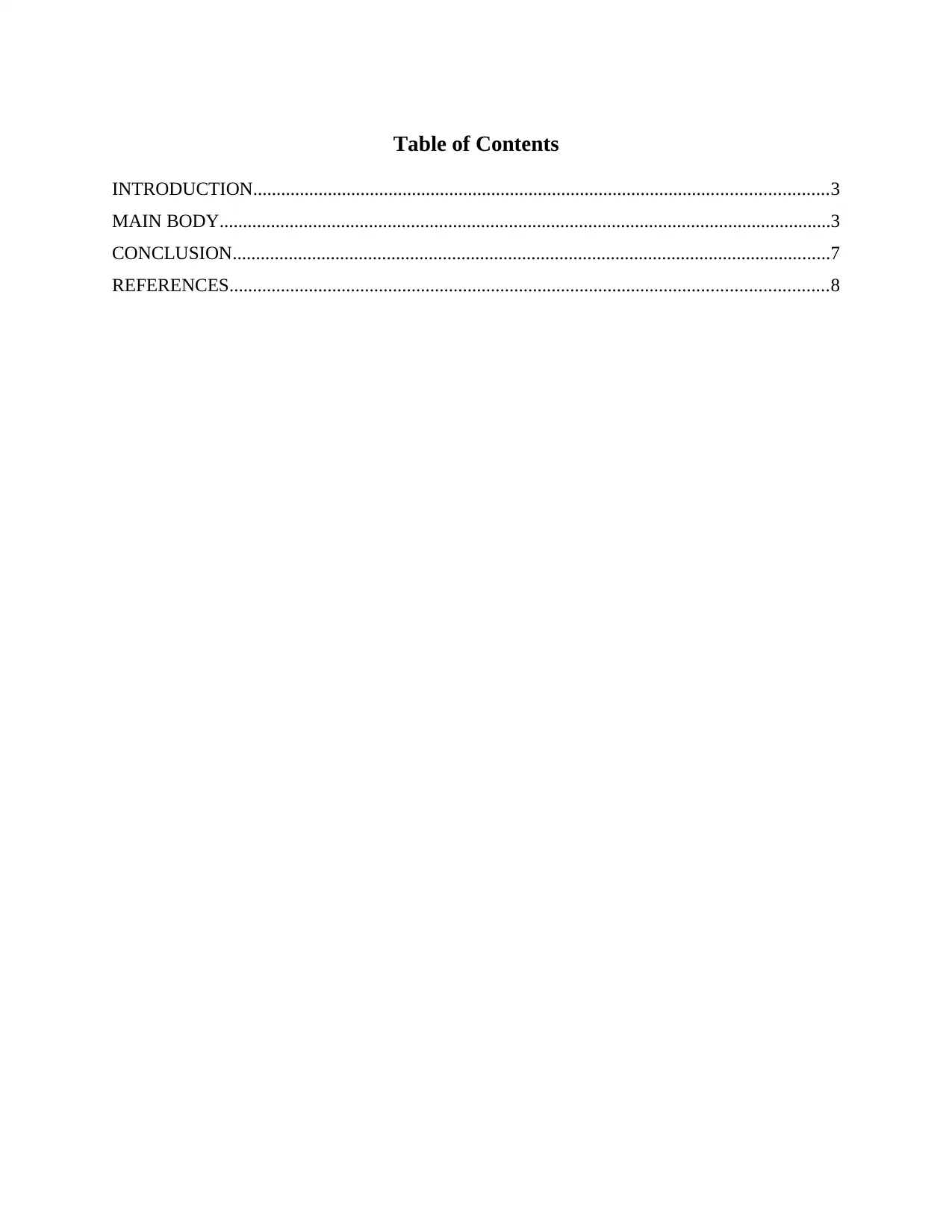
Table of Contents
INTRODUCTION...........................................................................................................................3
MAIN BODY...................................................................................................................................3
CONCLUSION................................................................................................................................7
REFERENCES................................................................................................................................8
INTRODUCTION...........................................................................................................................3
MAIN BODY...................................................................................................................................3
CONCLUSION................................................................................................................................7
REFERENCES................................................................................................................................8
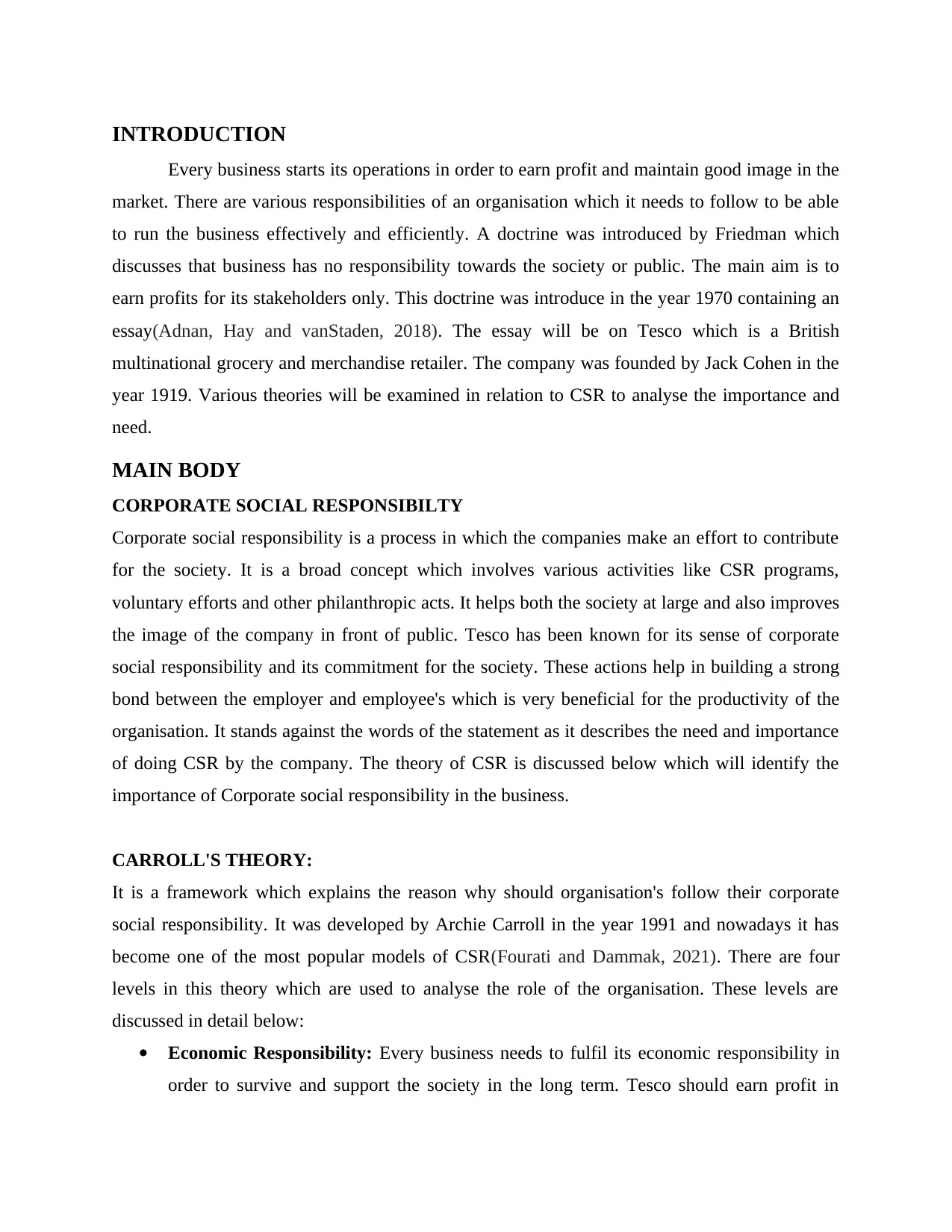
INTRODUCTION
Every business starts its operations in order to earn profit and maintain good image in the
market. There are various responsibilities of an organisation which it needs to follow to be able
to run the business effectively and efficiently. A doctrine was introduced by Friedman which
discusses that business has no responsibility towards the society or public. The main aim is to
earn profits for its stakeholders only. This doctrine was introduce in the year 1970 containing an
essay(Adnan, Hay and vanStaden, 2018). The essay will be on Tesco which is a British
multinational grocery and merchandise retailer. The company was founded by Jack Cohen in the
year 1919. Various theories will be examined in relation to CSR to analyse the importance and
need.
MAIN BODY
CORPORATE SOCIAL RESPONSIBILTY
Corporate social responsibility is a process in which the companies make an effort to contribute
for the society. It is a broad concept which involves various activities like CSR programs,
voluntary efforts and other philanthropic acts. It helps both the society at large and also improves
the image of the company in front of public. Tesco has been known for its sense of corporate
social responsibility and its commitment for the society. These actions help in building a strong
bond between the employer and employee's which is very beneficial for the productivity of the
organisation. It stands against the words of the statement as it describes the need and importance
of doing CSR by the company. The theory of CSR is discussed below which will identify the
importance of Corporate social responsibility in the business.
CARROLL'S THEORY:
It is a framework which explains the reason why should organisation's follow their corporate
social responsibility. It was developed by Archie Carroll in the year 1991 and nowadays it has
become one of the most popular models of CSR(Fourati and Dammak, 2021). There are four
levels in this theory which are used to analyse the role of the organisation. These levels are
discussed in detail below:
Economic Responsibility: Every business needs to fulfil its economic responsibility in
order to survive and support the society in the long term. Tesco should earn profit in
Every business starts its operations in order to earn profit and maintain good image in the
market. There are various responsibilities of an organisation which it needs to follow to be able
to run the business effectively and efficiently. A doctrine was introduced by Friedman which
discusses that business has no responsibility towards the society or public. The main aim is to
earn profits for its stakeholders only. This doctrine was introduce in the year 1970 containing an
essay(Adnan, Hay and vanStaden, 2018). The essay will be on Tesco which is a British
multinational grocery and merchandise retailer. The company was founded by Jack Cohen in the
year 1919. Various theories will be examined in relation to CSR to analyse the importance and
need.
MAIN BODY
CORPORATE SOCIAL RESPONSIBILTY
Corporate social responsibility is a process in which the companies make an effort to contribute
for the society. It is a broad concept which involves various activities like CSR programs,
voluntary efforts and other philanthropic acts. It helps both the society at large and also improves
the image of the company in front of public. Tesco has been known for its sense of corporate
social responsibility and its commitment for the society. These actions help in building a strong
bond between the employer and employee's which is very beneficial for the productivity of the
organisation. It stands against the words of the statement as it describes the need and importance
of doing CSR by the company. The theory of CSR is discussed below which will identify the
importance of Corporate social responsibility in the business.
CARROLL'S THEORY:
It is a framework which explains the reason why should organisation's follow their corporate
social responsibility. It was developed by Archie Carroll in the year 1991 and nowadays it has
become one of the most popular models of CSR(Fourati and Dammak, 2021). There are four
levels in this theory which are used to analyse the role of the organisation. These levels are
discussed in detail below:
Economic Responsibility: Every business needs to fulfil its economic responsibility in
order to survive and support the society in the long term. Tesco should earn profit in
⊘ This is a preview!⊘
Do you want full access?
Subscribe today to unlock all pages.

Trusted by 1+ million students worldwide
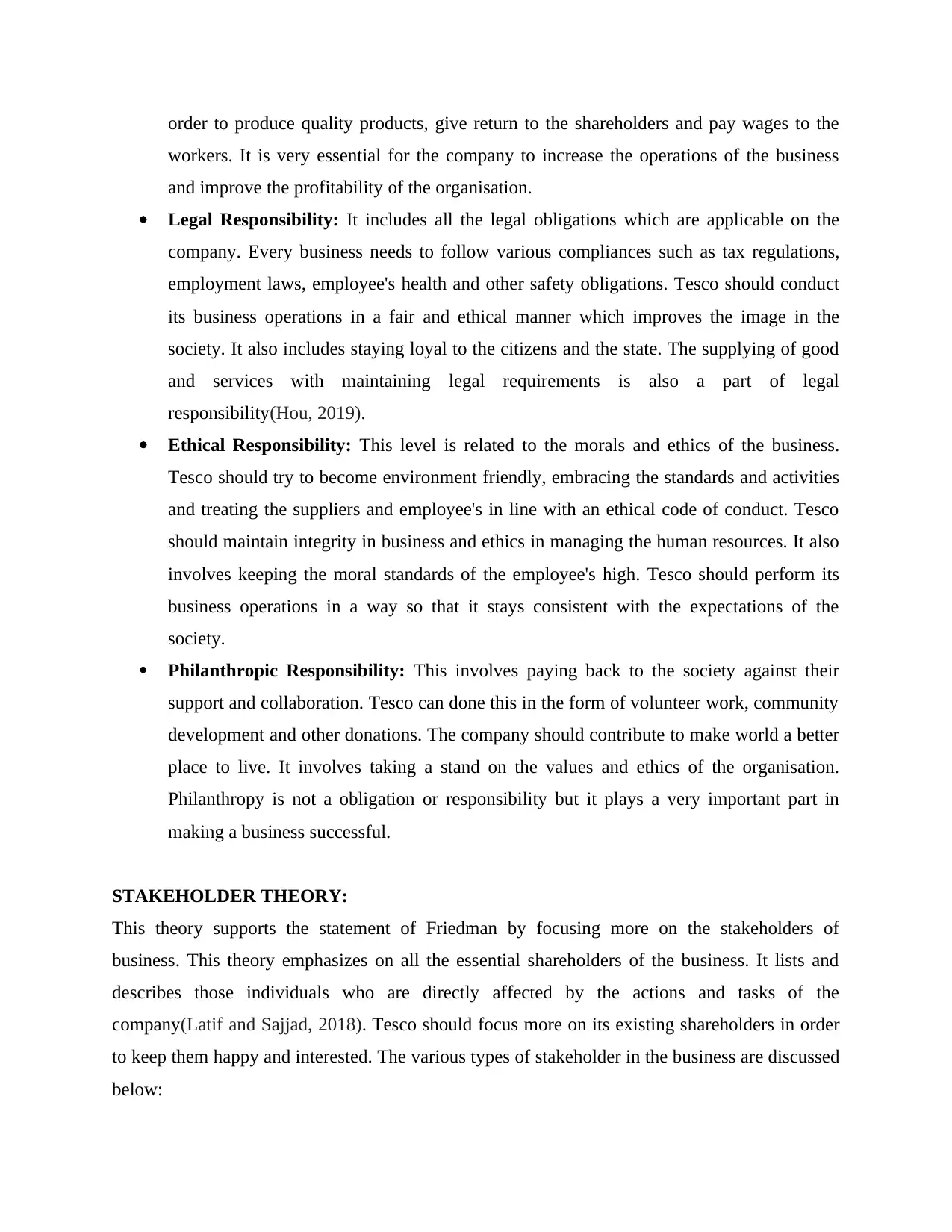
order to produce quality products, give return to the shareholders and pay wages to the
workers. It is very essential for the company to increase the operations of the business
and improve the profitability of the organisation.
Legal Responsibility: It includes all the legal obligations which are applicable on the
company. Every business needs to follow various compliances such as tax regulations,
employment laws, employee's health and other safety obligations. Tesco should conduct
its business operations in a fair and ethical manner which improves the image in the
society. It also includes staying loyal to the citizens and the state. The supplying of good
and services with maintaining legal requirements is also a part of legal
responsibility(Hou, 2019).
Ethical Responsibility: This level is related to the morals and ethics of the business.
Tesco should try to become environment friendly, embracing the standards and activities
and treating the suppliers and employee's in line with an ethical code of conduct. Tesco
should maintain integrity in business and ethics in managing the human resources. It also
involves keeping the moral standards of the employee's high. Tesco should perform its
business operations in a way so that it stays consistent with the expectations of the
society.
Philanthropic Responsibility: This involves paying back to the society against their
support and collaboration. Tesco can done this in the form of volunteer work, community
development and other donations. The company should contribute to make world a better
place to live. It involves taking a stand on the values and ethics of the organisation.
Philanthropy is not a obligation or responsibility but it plays a very important part in
making a business successful.
STAKEHOLDER THEORY:
This theory supports the statement of Friedman by focusing more on the stakeholders of
business. This theory emphasizes on all the essential shareholders of the business. It lists and
describes those individuals who are directly affected by the actions and tasks of the
company(Latif and Sajjad, 2018). Tesco should focus more on its existing shareholders in order
to keep them happy and interested. The various types of stakeholder in the business are discussed
below:
workers. It is very essential for the company to increase the operations of the business
and improve the profitability of the organisation.
Legal Responsibility: It includes all the legal obligations which are applicable on the
company. Every business needs to follow various compliances such as tax regulations,
employment laws, employee's health and other safety obligations. Tesco should conduct
its business operations in a fair and ethical manner which improves the image in the
society. It also includes staying loyal to the citizens and the state. The supplying of good
and services with maintaining legal requirements is also a part of legal
responsibility(Hou, 2019).
Ethical Responsibility: This level is related to the morals and ethics of the business.
Tesco should try to become environment friendly, embracing the standards and activities
and treating the suppliers and employee's in line with an ethical code of conduct. Tesco
should maintain integrity in business and ethics in managing the human resources. It also
involves keeping the moral standards of the employee's high. Tesco should perform its
business operations in a way so that it stays consistent with the expectations of the
society.
Philanthropic Responsibility: This involves paying back to the society against their
support and collaboration. Tesco can done this in the form of volunteer work, community
development and other donations. The company should contribute to make world a better
place to live. It involves taking a stand on the values and ethics of the organisation.
Philanthropy is not a obligation or responsibility but it plays a very important part in
making a business successful.
STAKEHOLDER THEORY:
This theory supports the statement of Friedman by focusing more on the stakeholders of
business. This theory emphasizes on all the essential shareholders of the business. It lists and
describes those individuals who are directly affected by the actions and tasks of the
company(Latif and Sajjad, 2018). Tesco should focus more on its existing shareholders in order
to keep them happy and interested. The various types of stakeholder in the business are discussed
below:
Paraphrase This Document
Need a fresh take? Get an instant paraphrase of this document with our AI Paraphraser
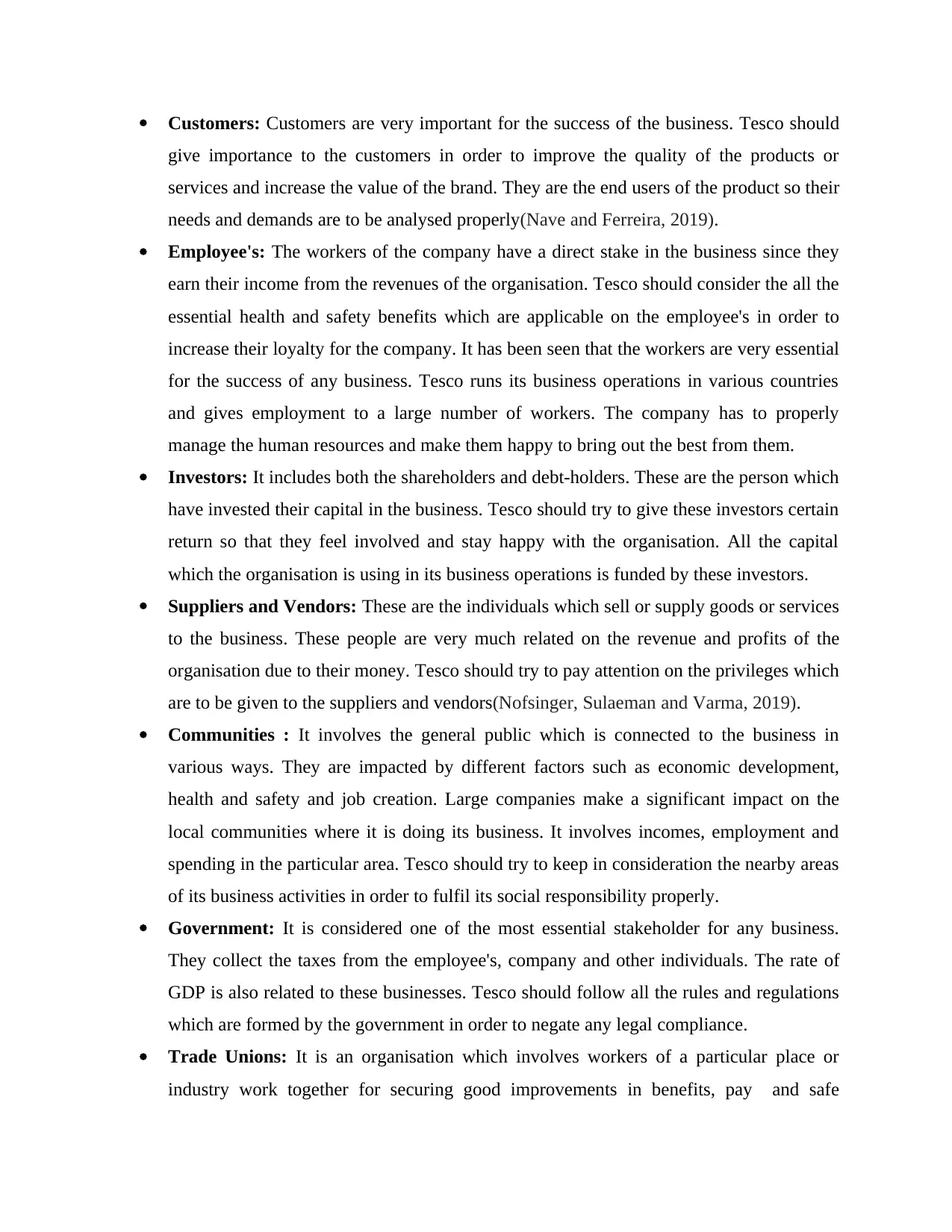
Customers: Customers are very important for the success of the business. Tesco should
give importance to the customers in order to improve the quality of the products or
services and increase the value of the brand. They are the end users of the product so their
needs and demands are to be analysed properly(Nave and Ferreira, 2019).
Employee's: The workers of the company have a direct stake in the business since they
earn their income from the revenues of the organisation. Tesco should consider the all the
essential health and safety benefits which are applicable on the employee's in order to
increase their loyalty for the company. It has been seen that the workers are very essential
for the success of any business. Tesco runs its business operations in various countries
and gives employment to a large number of workers. The company has to properly
manage the human resources and make them happy to bring out the best from them.
Investors: It includes both the shareholders and debt-holders. These are the person which
have invested their capital in the business. Tesco should try to give these investors certain
return so that they feel involved and stay happy with the organisation. All the capital
which the organisation is using in its business operations is funded by these investors.
Suppliers and Vendors: These are the individuals which sell or supply goods or services
to the business. These people are very much related on the revenue and profits of the
organisation due to their money. Tesco should try to pay attention on the privileges which
are to be given to the suppliers and vendors(Nofsinger, Sulaeman and Varma, 2019).
Communities : It involves the general public which is connected to the business in
various ways. They are impacted by different factors such as economic development,
health and safety and job creation. Large companies make a significant impact on the
local communities where it is doing its business. It involves incomes, employment and
spending in the particular area. Tesco should try to keep in consideration the nearby areas
of its business activities in order to fulfil its social responsibility properly.
Government: It is considered one of the most essential stakeholder for any business.
They collect the taxes from the employee's, company and other individuals. The rate of
GDP is also related to these businesses. Tesco should follow all the rules and regulations
which are formed by the government in order to negate any legal compliance.
Trade Unions: It is an organisation which involves workers of a particular place or
industry work together for securing good improvements in benefits, pay and safe
give importance to the customers in order to improve the quality of the products or
services and increase the value of the brand. They are the end users of the product so their
needs and demands are to be analysed properly(Nave and Ferreira, 2019).
Employee's: The workers of the company have a direct stake in the business since they
earn their income from the revenues of the organisation. Tesco should consider the all the
essential health and safety benefits which are applicable on the employee's in order to
increase their loyalty for the company. It has been seen that the workers are very essential
for the success of any business. Tesco runs its business operations in various countries
and gives employment to a large number of workers. The company has to properly
manage the human resources and make them happy to bring out the best from them.
Investors: It includes both the shareholders and debt-holders. These are the person which
have invested their capital in the business. Tesco should try to give these investors certain
return so that they feel involved and stay happy with the organisation. All the capital
which the organisation is using in its business operations is funded by these investors.
Suppliers and Vendors: These are the individuals which sell or supply goods or services
to the business. These people are very much related on the revenue and profits of the
organisation due to their money. Tesco should try to pay attention on the privileges which
are to be given to the suppliers and vendors(Nofsinger, Sulaeman and Varma, 2019).
Communities : It involves the general public which is connected to the business in
various ways. They are impacted by different factors such as economic development,
health and safety and job creation. Large companies make a significant impact on the
local communities where it is doing its business. It involves incomes, employment and
spending in the particular area. Tesco should try to keep in consideration the nearby areas
of its business activities in order to fulfil its social responsibility properly.
Government: It is considered one of the most essential stakeholder for any business.
They collect the taxes from the employee's, company and other individuals. The rate of
GDP is also related to these businesses. Tesco should follow all the rules and regulations
which are formed by the government in order to negate any legal compliance.
Trade Unions: It is an organisation which involves workers of a particular place or
industry work together for securing good improvements in benefits, pay and safe
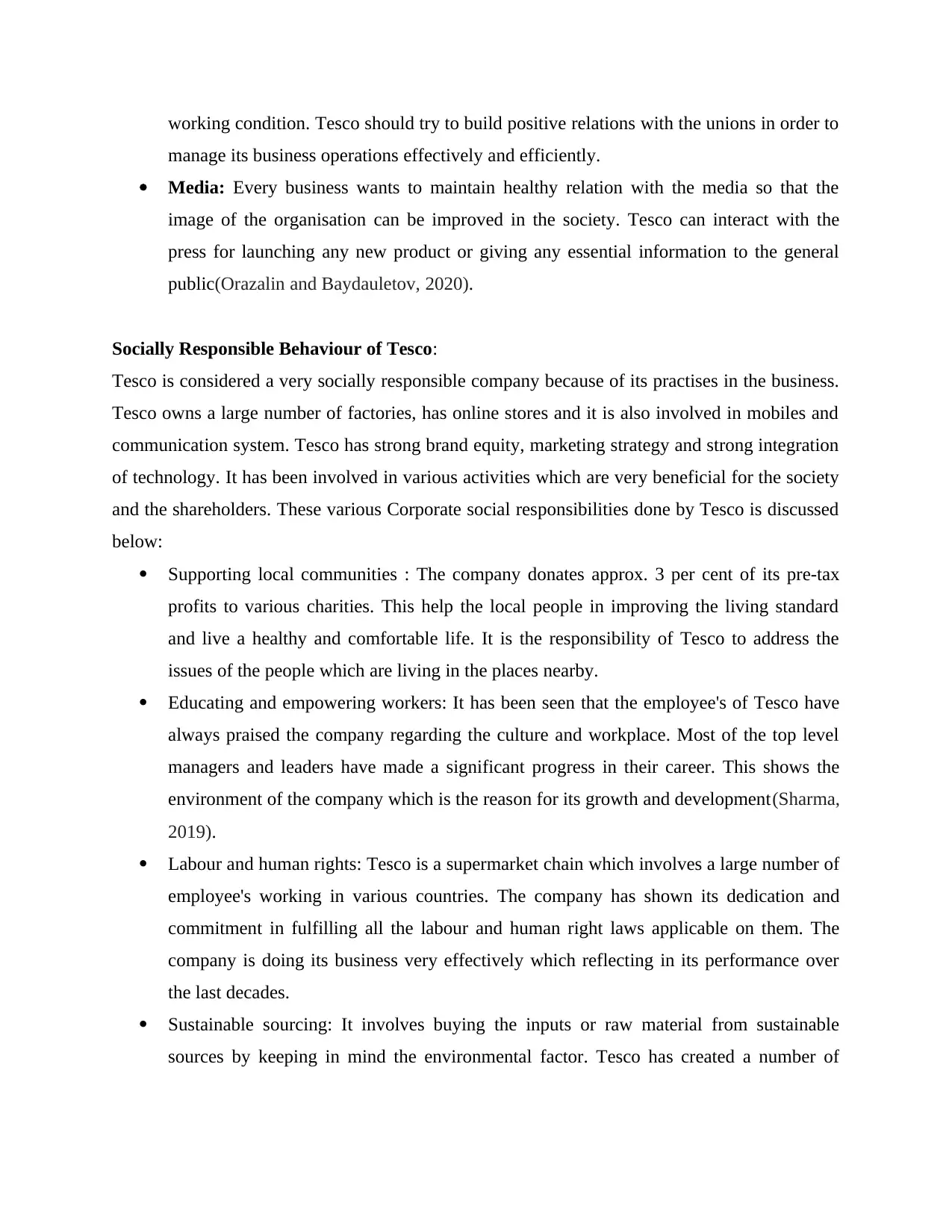
working condition. Tesco should try to build positive relations with the unions in order to
manage its business operations effectively and efficiently.
Media: Every business wants to maintain healthy relation with the media so that the
image of the organisation can be improved in the society. Tesco can interact with the
press for launching any new product or giving any essential information to the general
public(Orazalin and Baydauletov, 2020).
Socially Responsible Behaviour of Tesco:
Tesco is considered a very socially responsible company because of its practises in the business.
Tesco owns a large number of factories, has online stores and it is also involved in mobiles and
communication system. Tesco has strong brand equity, marketing strategy and strong integration
of technology. It has been involved in various activities which are very beneficial for the society
and the shareholders. These various Corporate social responsibilities done by Tesco is discussed
below:
Supporting local communities : The company donates approx. 3 per cent of its pre-tax
profits to various charities. This help the local people in improving the living standard
and live a healthy and comfortable life. It is the responsibility of Tesco to address the
issues of the people which are living in the places nearby.
Educating and empowering workers: It has been seen that the employee's of Tesco have
always praised the company regarding the culture and workplace. Most of the top level
managers and leaders have made a significant progress in their career. This shows the
environment of the company which is the reason for its growth and development(Sharma,
2019).
Labour and human rights: Tesco is a supermarket chain which involves a large number of
employee's working in various countries. The company has shown its dedication and
commitment in fulfilling all the labour and human right laws applicable on them. The
company is doing its business very effectively which reflecting in its performance over
the last decades.
Sustainable sourcing: It involves buying the inputs or raw material from sustainable
sources by keeping in mind the environmental factor. Tesco has created a number of
manage its business operations effectively and efficiently.
Media: Every business wants to maintain healthy relation with the media so that the
image of the organisation can be improved in the society. Tesco can interact with the
press for launching any new product or giving any essential information to the general
public(Orazalin and Baydauletov, 2020).
Socially Responsible Behaviour of Tesco:
Tesco is considered a very socially responsible company because of its practises in the business.
Tesco owns a large number of factories, has online stores and it is also involved in mobiles and
communication system. Tesco has strong brand equity, marketing strategy and strong integration
of technology. It has been involved in various activities which are very beneficial for the society
and the shareholders. These various Corporate social responsibilities done by Tesco is discussed
below:
Supporting local communities : The company donates approx. 3 per cent of its pre-tax
profits to various charities. This help the local people in improving the living standard
and live a healthy and comfortable life. It is the responsibility of Tesco to address the
issues of the people which are living in the places nearby.
Educating and empowering workers: It has been seen that the employee's of Tesco have
always praised the company regarding the culture and workplace. Most of the top level
managers and leaders have made a significant progress in their career. This shows the
environment of the company which is the reason for its growth and development(Sharma,
2019).
Labour and human rights: Tesco is a supermarket chain which involves a large number of
employee's working in various countries. The company has shown its dedication and
commitment in fulfilling all the labour and human right laws applicable on them. The
company is doing its business very effectively which reflecting in its performance over
the last decades.
Sustainable sourcing: It involves buying the inputs or raw material from sustainable
sources by keeping in mind the environmental factor. Tesco has created a number of
⊘ This is a preview!⊘
Do you want full access?
Subscribe today to unlock all pages.

Trusted by 1+ million students worldwide
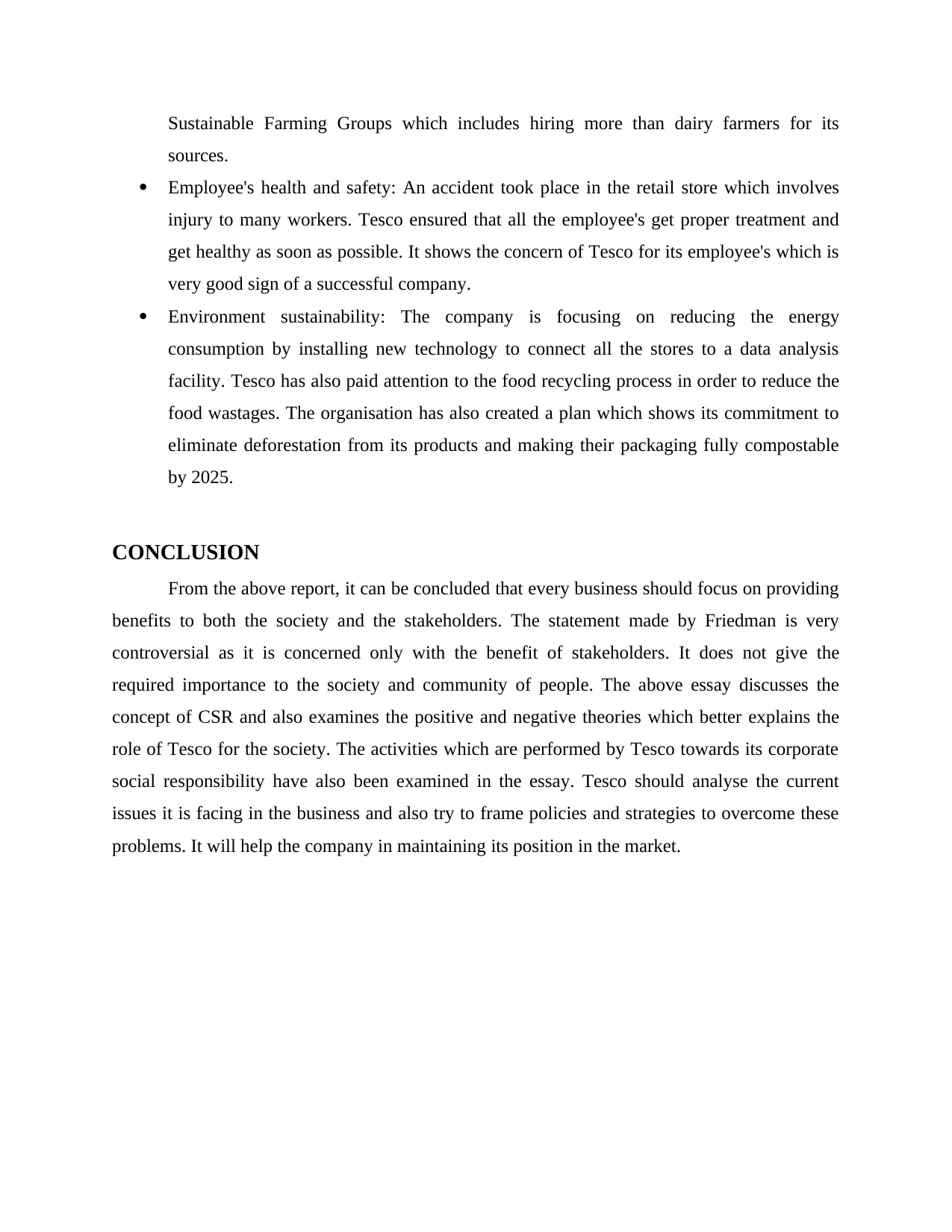
Sustainable Farming Groups which includes hiring more than dairy farmers for its
sources.
Employee's health and safety: An accident took place in the retail store which involves
injury to many workers. Tesco ensured that all the employee's get proper treatment and
get healthy as soon as possible. It shows the concern of Tesco for its employee's which is
very good sign of a successful company.
Environment sustainability: The company is focusing on reducing the energy
consumption by installing new technology to connect all the stores to a data analysis
facility. Tesco has also paid attention to the food recycling process in order to reduce the
food wastages. The organisation has also created a plan which shows its commitment to
eliminate deforestation from its products and making their packaging fully compostable
by 2025.
CONCLUSION
From the above report, it can be concluded that every business should focus on providing
benefits to both the society and the stakeholders. The statement made by Friedman is very
controversial as it is concerned only with the benefit of stakeholders. It does not give the
required importance to the society and community of people. The above essay discusses the
concept of CSR and also examines the positive and negative theories which better explains the
role of Tesco for the society. The activities which are performed by Tesco towards its corporate
social responsibility have also been examined in the essay. Tesco should analyse the current
issues it is facing in the business and also try to frame policies and strategies to overcome these
problems. It will help the company in maintaining its position in the market.
sources.
Employee's health and safety: An accident took place in the retail store which involves
injury to many workers. Tesco ensured that all the employee's get proper treatment and
get healthy as soon as possible. It shows the concern of Tesco for its employee's which is
very good sign of a successful company.
Environment sustainability: The company is focusing on reducing the energy
consumption by installing new technology to connect all the stores to a data analysis
facility. Tesco has also paid attention to the food recycling process in order to reduce the
food wastages. The organisation has also created a plan which shows its commitment to
eliminate deforestation from its products and making their packaging fully compostable
by 2025.
CONCLUSION
From the above report, it can be concluded that every business should focus on providing
benefits to both the society and the stakeholders. The statement made by Friedman is very
controversial as it is concerned only with the benefit of stakeholders. It does not give the
required importance to the society and community of people. The above essay discusses the
concept of CSR and also examines the positive and negative theories which better explains the
role of Tesco for the society. The activities which are performed by Tesco towards its corporate
social responsibility have also been examined in the essay. Tesco should analyse the current
issues it is facing in the business and also try to frame policies and strategies to overcome these
problems. It will help the company in maintaining its position in the market.
Paraphrase This Document
Need a fresh take? Get an instant paraphrase of this document with our AI Paraphraser
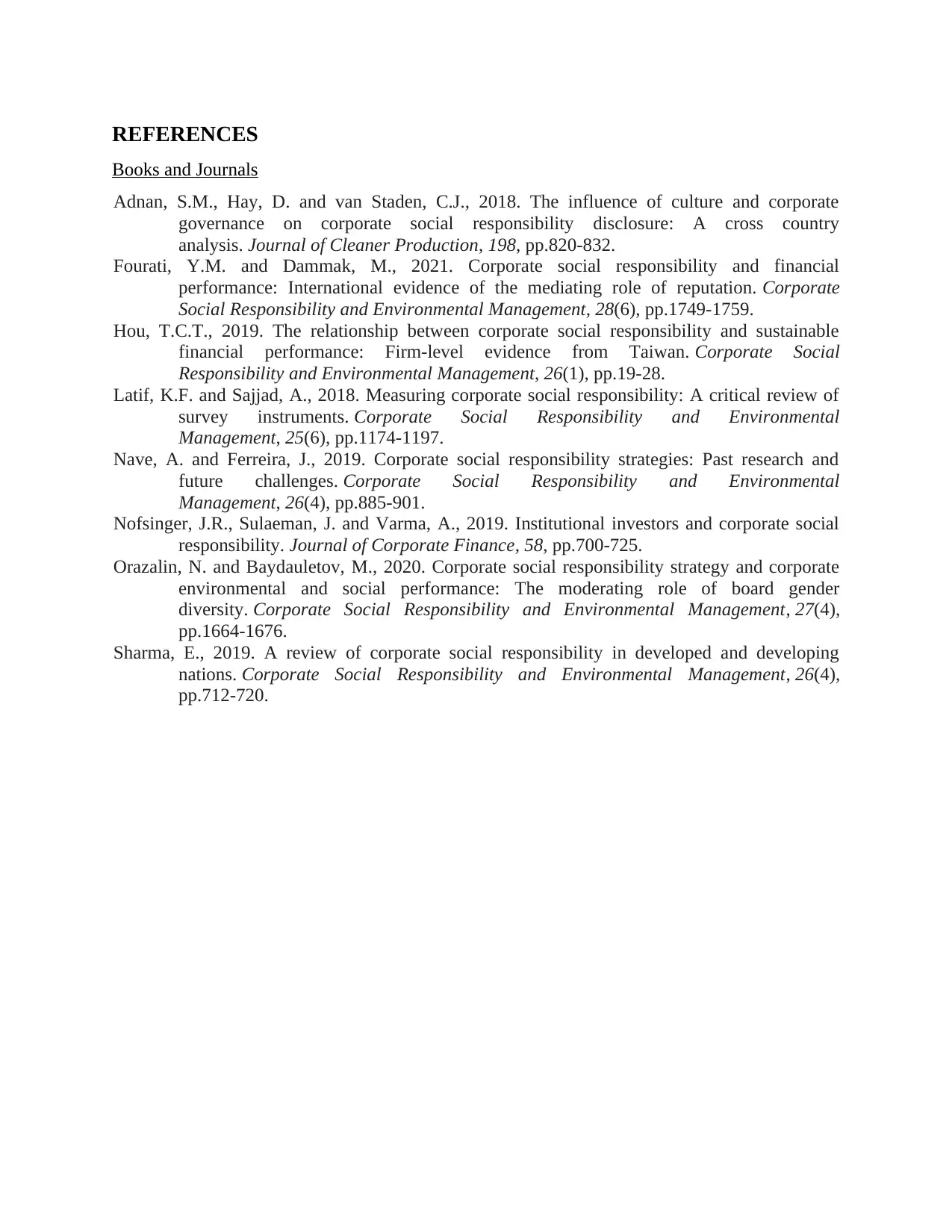
REFERENCES
Books and Journals
Adnan, S.M., Hay, D. and van Staden, C.J., 2018. The influence of culture and corporate
governance on corporate social responsibility disclosure: A cross country
analysis. Journal of Cleaner Production, 198, pp.820-832.
Fourati, Y.M. and Dammak, M., 2021. Corporate social responsibility and financial
performance: International evidence of the mediating role of reputation. Corporate
Social Responsibility and Environmental Management, 28(6), pp.1749-1759.
Hou, T.C.T., 2019. The relationship between corporate social responsibility and sustainable
financial performance: Firm‐level evidence from Taiwan. Corporate Social
Responsibility and Environmental Management, 26(1), pp.19-28.
Latif, K.F. and Sajjad, A., 2018. Measuring corporate social responsibility: A critical review of
survey instruments. Corporate Social Responsibility and Environmental
Management, 25(6), pp.1174-1197.
Nave, A. and Ferreira, J., 2019. Corporate social responsibility strategies: Past research and
future challenges. Corporate Social Responsibility and Environmental
Management, 26(4), pp.885-901.
Nofsinger, J.R., Sulaeman, J. and Varma, A., 2019. Institutional investors and corporate social
responsibility. Journal of Corporate Finance, 58, pp.700-725.
Orazalin, N. and Baydauletov, M., 2020. Corporate social responsibility strategy and corporate
environmental and social performance: The moderating role of board gender
diversity. Corporate Social Responsibility and Environmental Management, 27(4),
pp.1664-1676.
Sharma, E., 2019. A review of corporate social responsibility in developed and developing
nations. Corporate Social Responsibility and Environmental Management, 26(4),
pp.712-720.
Books and Journals
Adnan, S.M., Hay, D. and van Staden, C.J., 2018. The influence of culture and corporate
governance on corporate social responsibility disclosure: A cross country
analysis. Journal of Cleaner Production, 198, pp.820-832.
Fourati, Y.M. and Dammak, M., 2021. Corporate social responsibility and financial
performance: International evidence of the mediating role of reputation. Corporate
Social Responsibility and Environmental Management, 28(6), pp.1749-1759.
Hou, T.C.T., 2019. The relationship between corporate social responsibility and sustainable
financial performance: Firm‐level evidence from Taiwan. Corporate Social
Responsibility and Environmental Management, 26(1), pp.19-28.
Latif, K.F. and Sajjad, A., 2018. Measuring corporate social responsibility: A critical review of
survey instruments. Corporate Social Responsibility and Environmental
Management, 25(6), pp.1174-1197.
Nave, A. and Ferreira, J., 2019. Corporate social responsibility strategies: Past research and
future challenges. Corporate Social Responsibility and Environmental
Management, 26(4), pp.885-901.
Nofsinger, J.R., Sulaeman, J. and Varma, A., 2019. Institutional investors and corporate social
responsibility. Journal of Corporate Finance, 58, pp.700-725.
Orazalin, N. and Baydauletov, M., 2020. Corporate social responsibility strategy and corporate
environmental and social performance: The moderating role of board gender
diversity. Corporate Social Responsibility and Environmental Management, 27(4),
pp.1664-1676.
Sharma, E., 2019. A review of corporate social responsibility in developed and developing
nations. Corporate Social Responsibility and Environmental Management, 26(4),
pp.712-720.
1 out of 8
Related Documents
Your All-in-One AI-Powered Toolkit for Academic Success.
+13062052269
info@desklib.com
Available 24*7 on WhatsApp / Email
![[object Object]](/_next/static/media/star-bottom.7253800d.svg)
Unlock your academic potential
Copyright © 2020–2026 A2Z Services. All Rights Reserved. Developed and managed by ZUCOL.





